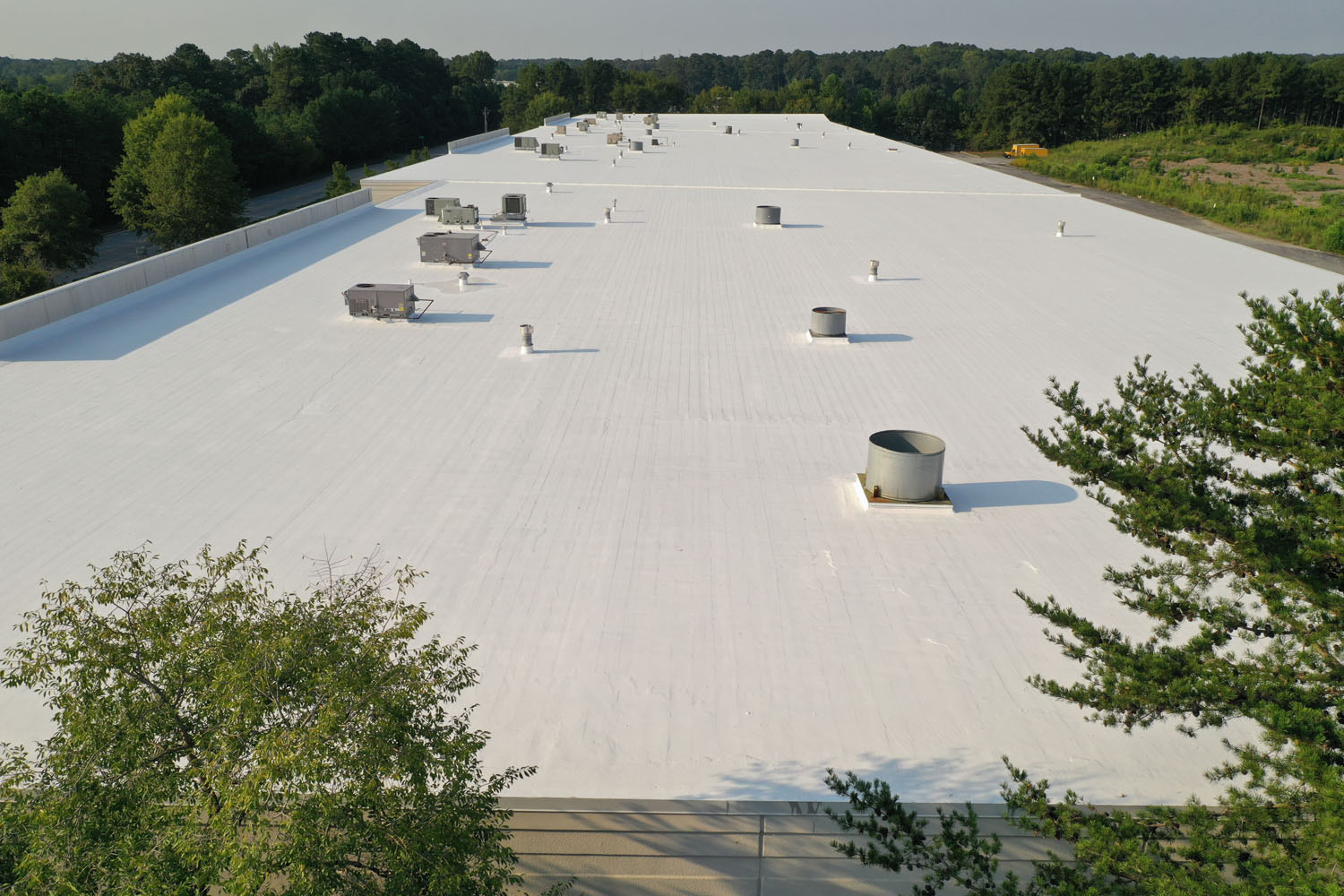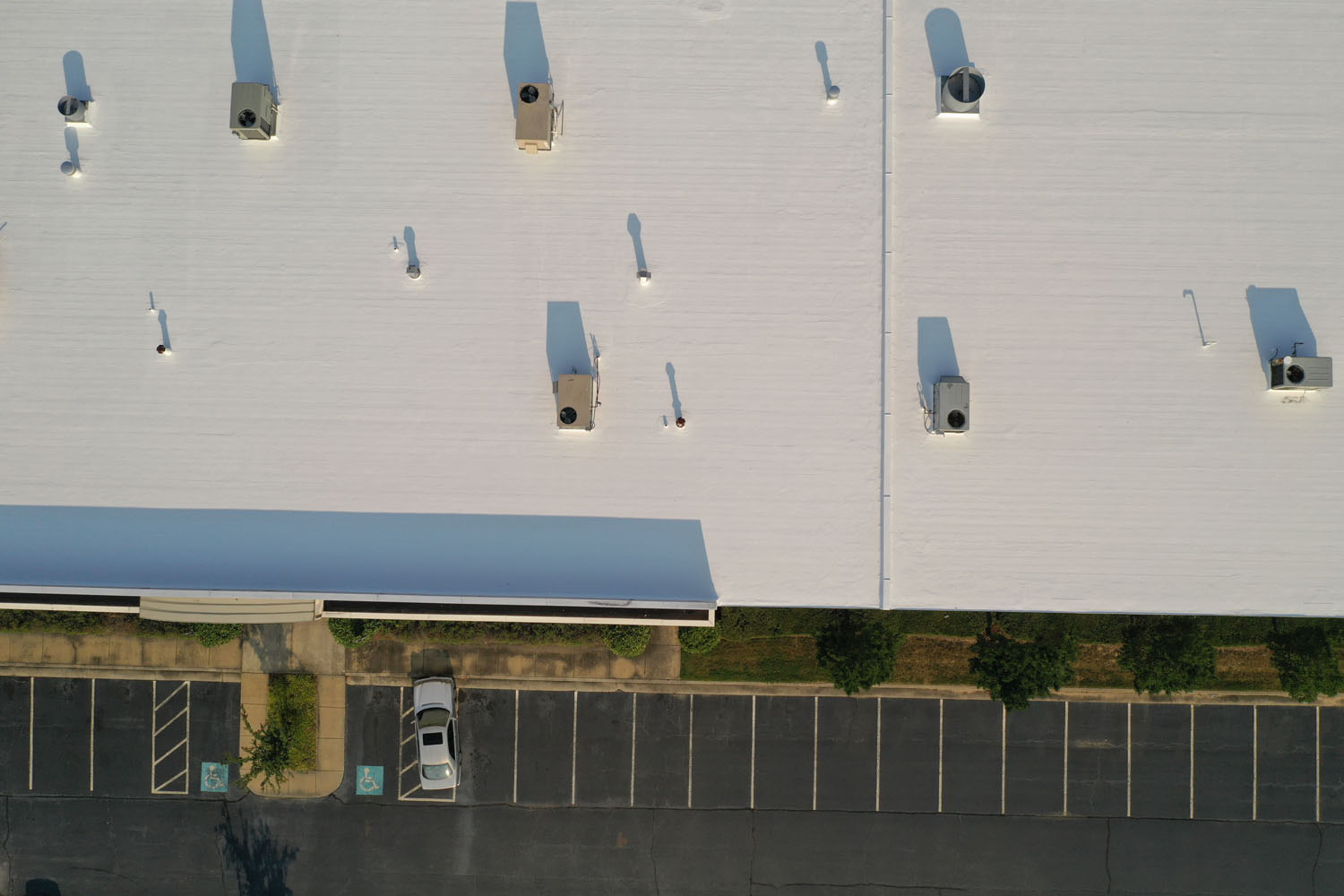When was the last time you evaluated how much energy escapes through your commercial building’s roof? Commercial roofing serves more than just a protective function—it’s a critical element for indoor climate control and energy efficiency. Spray Polyurethane Foam (SPF) roofing has emerged as a powerful solution across the U.S. due to its exceptional insulation properties. As energy costs rise and sustainability becomes a priority, focusing on roof insulation is essential for property owners and managers.
SPF roofing creates a seamless barrier that effectively seals buildings, significantly lowering heating and cooling costs. This system enhances thermal efficiency by reducing air loss, which is common in less insulated structures. Here, we explore the insulation power of spray foam roofing and why it’s ideal for commercial reroof projects focused on energy performance and sustainability.
The Insulation Benefits of SPF Roofing
The insulation quality of your roofing system directly impacts your property’s energy efficiency. SPF roofing provides key benefits that contribute to substantial savings for property managers and owners.
Superior R-Value for Optimal Insulation
One of SPF roofing’s primary advantages is its high R-value, which measures a material’s resistance to heat flow. A higher R-value means better insulation, and SPF roofing forms a seamless layer with robust thermal resistance, reducing heat transfer and maintaining stable indoor temperatures. This is especially valuable in extreme climates, like Phoenix, AZ, or Chicago, IL, where SPF keeps buildings cool in summer and warm in winter, easing HVAC system strain.
Airtight Seal and Moisture Resistance
Another benefit of SPF roofing is its ability to fill gaps that other insulation methods might miss. The liquid foam expands on application, creating an airtight seal that eliminates air leaks and prevents moisture intrusion, which is crucial in humid climates like Miami, FL. This moisture-resistant property helps preserve roofing integrity, reducing maintenance needs over time.
Enhanced Soundproofing for Urban Properties
SPF roofing also provides enhanced soundproofing, beneficial for properties in busy urban areas like New York, NY, or Los Angeles, CA. Its dense, continuous barrier dampens noise pollution, creating a more comfortable and productive environment for building occupants.
Long-Term Cost Savings with SPF Roofing
For businesses looking to lower operational costs, SPF roofing offers significant long-term savings by reducing heating and cooling expenses. Its durability means reduced maintenance and repair costs, making SPF a smart investment for those focused on financial planning.
Sustainability and Carbon Footprint Reduction
SPF roofing also aligns with sustainable building practices by helping reduce carbon emissions, making it a great choice in eco-conscious cities like Seattle, WA, or San Francisco, CA. The environmentally-friendly aspects of SPF roofing add appeal for tenants and stakeholders interested in sustainable properties.
The Science of Thermal Resistance in SPF Roofing
The thermal resistance, or R-value, of spray foam roofing is pivotal to its performance as an insulator. This characteristic maintains consistent indoor temperatures, helping reduce energy demands. Spray polyurethane foam achieves high thermal resistance due to its structure of trapped air bubbles that minimize heat flow, resulting in lower heating and cooling costs.
Impact of SPF Thickness and Customization
The thickness of SPF layers directly affects their R-value. Thicker applications offer better insulation, which is particularly beneficial in extreme temperatures. With SPF’s flexibility in thickness, property managers can customize insulation levels suitable for various climates across the United States.
Extended Roof Lifespan and Reduced Maintenance
Thermal resistance also boosts roof durability by reducing heat transfer, minimizing thermal stress, and preventing issues like thermal bridging. This prolongs roof lifespan and lowers maintenance costs, making SPF roofing a cost-effective solution.
Seamless Application and Reflective Properties
SPF’s seamless application prevents air and moisture infiltration, enhancing thermal resistance and maintaining indoor air quality. This control over indoor environment is essential in commercial settings focused on comfort and productivity.
Reflective Properties for Hot Climates
In hot climates like Phoenix, AZ, or Dallas, TX, SPF’s reflective properties improve energy efficiency by reflecting sunlight and reducing the urban heat island effect. This aspect aligns with sustainability goals for environmentally-conscious building owners.
Application Techniques of SPF Roofing
Proper application of spray polyurethane foam roofing is essential for optimizing its insulating properties, durability, and longevity.
- Surface Preparation: A clean, dry surface ensures optimal adhesion, often requiring power washing and repairs.
- Specialized Equipment: Mixing two liquid compounds to form a solid foam layer requires precision; environmental conditions like humidity also influence curing.
- Application and Curing: Experienced applicators apply SPF in thin, even passes to control thickness, maximizing insulation without structural issues. A protective top coating shields the foam from UV rays, extending roof lifespan.
FAQs on Spray Foam Roofing Insulation
FAQ 1: What specific insulation benefits does spray foam offer to commercial buildings?
Spray foam insulation forms a robust barrier against air leaks and thermal transfer, optimizing energy efficiency. It conforms to roof structures, sealing gaps and maintaining stable indoor temperatures, reducing HVAC strain.
FAQ 2: Can spray foam insulation significantly reduce energy bills?
Yes, spray foam insulation cuts energy bills by minimizing air leaks and enhancing thermal resistance. Many property owners notice substantial savings as HVAC demands decrease, making SPF cost-effective for long-term savings.
FAQ 3: What is a polyurethane roof coating, and how does it benefit roofs?
A polyurethane roof coating adds durability, providing UV protection, leak prevention, and ponding water resistance. Its reflective properties lower cooling costs in hot weather, enhancing energy efficiency.
Choosing SPF Roofing for Energy Efficiency and Durability
Understanding SPF roofing’s role in energy efficiency highlights its impact on reducing operational costs for commercial properties. SPF’s high R-value limits heat transfer, ensuring consistent indoor temperatures across climates, while its seamless application fills gaps and enhances building integrity. For property managers focused on sustainability, SPF roofing reduces carbon footprints, future-proofs buildings, and provides long-term benefits.
Opting for SPF roofing energy efficiency for commercial buildings aligns with sustainability trends, supports cost-saving goals, and offers durability, making it an ideal choice for modern commercial property management.



